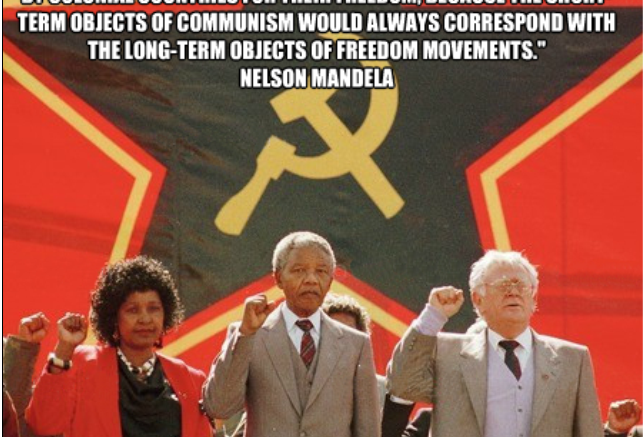Nelson Mandela, South Africa’s first Black president, who is widely admired across the political spectrum more for his performance in office than for his beliefs, is now retired and thus free to express his long standing Marxist and often bizarre beliefs freely. He continually attacks U.S. “imperialism” and “arrogance” while voicing support for the likes of Libya, Iraq, and Cuba. This is not surprising. Mandela did support violence in the past – a fact that is largely forgotten or trivialized. Indeed, in 1961 he was the founder of Umkhonto we Siswe (“Spear of the People”), ANC’s terrorist arm, and never during his long years in prison did he condemn that organization’s acts of indiscriminate terrorism. Moreover, throughout his career Mandela has remained close to regimes actively supporting terrorism – the former Soviet Union, Libya and Cuba.
There were good reasons for such fears, not the least being the decades old cohabitation of Mandela’s African National Congress (ANC) with, and its penetration by, the Communist Party of South Africa (SACP), one of the world’s most committed Stalinist parties. There were also the ANC’s close links with the militantly leftist (and SACP dominated) trade union federation, COSATU. Importantly, despite the rhetoric about Black economic oppression under apartheid, the fact remains that a Black middle and indeed upper class had developed in South Africa, the interests of which had little to do with the traditional socialism advocated by the ANC throughout its history.
Mandela implemented an aggressive affirmative action policy once he took office – which slowed down the economy. His government established a criminal law code on the European model – abolition of the death penalty, excessive rights for accused criminals, etc., with destructive results. South Africa today competes with civil war-torn Colombia for the dubious distinction of being the world’s most crime-ridden country. Interpol’s International Crime Statistics say it all: in 1999 South Africa had 121 murders and 119 rapes per 100,000 inhabitants, compared with Colombia’s 69 and 6 respectively (and the United States’ 5 and 32). The trends are no more encouraging considering that in 1994 the world’s average murder rate was 5.5 per 100,000, compared to South Africa’s 45. In such circumstances, and with a slow justice system, which only produces a 10 percent conviction rate, South Africa has seen the rise of vigilante groups filling the void left by an incompetent (affirmative action, again – one third of policemen are functionally illiterate) and violent police – who between 1997 and 2000 killed 1,550 people, compared with 2,700 killed by the apartheid regime in 30 years.
The high crime rates, and a decline in educational standards, led to a massive emigration of White professionals to the United States, UK, Canada, and Australia. A 1998 poll of 11,000 skilled professionals suggested that 74 percent wanted to emigrate – with then-president Mandela responding with “Good riddance” to them. The problem is that not just professionals leave South Africa – major corporations also moved out, including mining giant Anglo American Co. and South African Breweries, both of which are now headquartered in London.
When it comes to African opinions at the UN, Pretoria prefers to side with the worst. Libya for chairmanship of the UN Human Rights Commission? Yes, said Pretoria, and so did the rest of the African bloc. Support Mugabe’s “right” to be invited to Lisbon for the EU-African Summit? Yes again, at the cost of billions of dollars in aid to Africa. Mandela’s ideological legacy seems to be alive in Pretoria’s international behavior. None of this should come as a surprise. The once dominant South African National Defense Force (SANDF) is now only a shadow of its past self, largely as a result of budget cuts and affirmative action, which put former ANC terrorist thugs and gang members in charge and led to a massive exodus of White and Coloured officers.
President Mbeki has a problem with his own ANC party, specifically with Nelson Mandela’s former wife, Winnie. Mrs. Mandela is the loose cannon of the ANC. A convicted torturer and felon and thoroughly corrupt, she remains a very popular figure with Black South African youths and was repeatedly elected to the ANC leadership. The disturbing thing here is not so much Winnie’s criminality, awful as it is, as the general decline of South Africa’s judiciary, which is becoming increasingly more “African” and less and less Western.
– Michael Radu, Front Page Magazine, February 6, 2003
http://crime-of-apartheid.blogspot.com/2011/01/20-may-1983-mandelas-church-st-bomb.html


